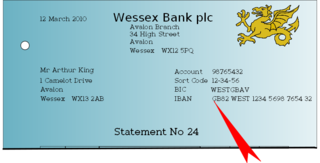Related Research Articles

The International Bank Account Number (IBAN) is an internationally agreed upon system of identifying bank accounts across national borders to facilitate the communication and processing of cross border transactions with a reduced risk of transcription errors. An IBAN uniquely identifies the account of a customer at a financial institution. It was originally adopted by the European Committee for Banking Standards (ECBS) and since 1997 as the international standard ISO 13616 under the International Organization for Standardization (ISO). The current version is ISO 13616:2020, which indicates the Society for Worldwide Interbank Financial Telecommunication (SWIFT) as the formal registrar. Initially developed to facilitate payments within the European Union, it has been implemented by most European countries and numerous countries in other parts of the world, mainly in the Middle East and the Caribbean. By July 2023, 86 countries were using the IBAN numbering system.

A ticker symbol or stock symbol is an abbreviation used to uniquely identify publicly traded shares of a particular stock on a particular stock market. In short, ticker symbols are arrangements of symbols or characters representing specific assets or securities listed on a stock exchange or traded publicly. A stock symbol may consist of letters, numbers, or a combination of both. "Ticker symbol" refers to the symbols that were printed on the ticker tape of a ticker tape machine.

A vehicle identification number is a unique code, including a serial number, used by the automotive industry to identify individual motor vehicles, towed vehicles, motorcycles, scooters and mopeds, as defined by the International Organization for Standardization in ISO 3779 and ISO 4030.
Standard High German (SHG), less precisely Standard German or High German, is the umbrella term for the standardized varieties of the German language, which are used in formal contexts and for communication between different dialect areas. German is a pluricentric Dachsprache with currently three codified specific national varieties: German Standard German, Austrian Standard German and Swiss Standard German.
An International Securities Identification Number (ISIN) is a code that uniquely identifies a security globally for the purposes of facilitating clearing, reporting and settlement of trades. Its structure is defined in ISO 6166. The ISIN code is a 12-character alphanumeric code that serves for uniform identification of a security through normalization of the assigned National Number, where one exists, at trading and settlement.
The German orthography reform of 1996 was a change to German spelling and punctuation that was intended to simplify German orthography and thus to make it easier to learn, without substantially changing the rules familiar to users of the language.
ISO 10962, known as Classification of Financial Instruments (CFI), is a six-letter-code used in the financial services industry to classify and describe the structure and function of a financial instrument as part of the instrument reference data. It is an international standard approved by the International Organization for Standardization (ISO). CFI have been required since 1 July 2017.
A check digit is a form of redundancy check used for error detection on identification numbers, such as bank account numbers, which are used in an application where they will at least sometimes be input manually. It is analogous to a binary parity bit used to check for errors in computer-generated data. It consists of one or more digits computed by an algorithm from the other digits in the sequence input.
Vehicle registration plates are mandatory alphanumeric plates used to display the registration mark of a vehicle registered in Germany. They have existed in the country since 1906, with the current system in use since 1956. German registration plates are alphanumeric plates in a standardized format, issued officially by the district authorities.
A CUSIP is a nine-character numeric or alphanumeric code that uniquely identifies a North American financial security for the purposes of facilitating clearing and settlement of trades. All CUSIP identifiers are fungible, which means that a unique CUSIP identifier for each individual security stays the same, regardless of the exchange where the shares were purchased or venue on which the shares were traded. CUSIP was adopted as an American national standard by the Accredited Standards Committee X9 and is designated ANSI X9.6. CUSIP was re-approved as an ANSI standard in December 2020. The acronym derives from Committee on Uniform Security Identification Procedures.
A national identification number, national identity number, or national insurance number or JMBG/EMBG is used by the governments of many countries as a means of tracking their citizens, permanent residents, and temporary residents for the purposes of work, taxation, government benefits, health care, and other governmentally-related functions.

A German passport is an identity document issued to nationals of Germany for the purpose of international travel. A German passport is, besides the German ID card and the German Emergency Travel Document, the only other officially recognised document that German authorities will routinely accept as proof of identity from German citizens. Besides serving as proof of identity and presumption of German nationality, they facilitate the process of securing assistance from German consular officials abroad. German passports are valid for ten years or six years and share the standardised layout and burgundy red design with other EU passports. Every German citizen is also a citizen of the European Union. The passport, along with the national identity card, allows for free rights of movement and residence in any of the states of the European Union, European Economic Area and Switzerland.

The IMO number of the International Maritime Organization is a generic term covering two distinct meanings. The IMO ship identification number is a unique ship identifier; the IMO company and registered owner identification number is used to identify uniquely each company and/or registered owner managing ships of at least 100 gross tons (gt). The schemes are managed in parallel, but IMO company/owner numbers may also be obtained by managers of vessels not having IMO ship numbers. IMO numbers were introduced to improve maritime safety and reduce fraud and pollution, under the International Convention for the Safety of Life at Sea (SOLAS).
The VALOR number is a code which uniquely identifies listed securities and financial instruments in Switzerland, and serves a similar purpose to CUSIP or WKN in the North American or German markets respectively. The VALOR number is incorporated in the Swiss ISIN number.

In the United States, a Social Security number (SSN) is a nine-digit number issued to U.S. citizens, permanent residents, and temporary (working) residents under section 205(c)(2) of the Social Security Act, codified as . The number is issued to an individual by the Social Security Administration, an independent agency of the United States government. Although the original purpose for the number was for the Social Security Administration to track individuals, the Social Security number has become a de facto national identification number for taxation and other purposes.
ISO 9564 is an international standard for personal identification number (PIN) management and security in financial services.

The German Identity Card is issued to German citizens by local registration offices in Germany and diplomatic missions abroad, while it is produced at the Bundesdruckerei in Berlin.
Cologne phonetics is a phonetic algorithm which assigns to words a sequence of digits, the phonetic code. The aim of this procedure is that identical sounding words have the same code assigned to them. The algorithm can be used to perform a similarity search between words. For example, it is possible in a name list to find entries like "Meier" under different spellings such as "Maier", "Mayer", or "Mayr". The Cologne phonetics is related to the well known Soundex phonetic algorithm but is optimized to match the German language. The algorithm was published in 1969 by Hans Joachim Postel.
The Börsen-Zeitung is the main daily newspaper in Germany exclusively focused on the financial markets. The Börsen-Zeitung's headquarters is in Frankfurt, with editorial offices in Berlin, Düsseldorf, Hamburg, Munich and Stuttgart, as well as Brussels, London, New York, Madrid, Milan, Paris, Shanghai, Tokyo, Washington, DC, and Zurich.

Daniela Alfinito is a German schlager singer from Hesse, Germany. She achieved first chart success with her 2015 album Ein bisschen sterben and reached number one in Germany with her 2019 and 2020 albums Du warst jede Träne wert and Liebes-Tattoo.
References
- ↑ signup required
- ↑ signup required
- ↑ Struktur und Aufbau der deutschen Wertpapier-Kenn-Nummer (WKN) (PDF), WM-Datenservice, 2012
- ↑ Körbitzer, K.-P. (27 January 2000), Allgemeine Kundeninformation 2000/02: Reorganisation der deutschen WKN-Systematik (PDF), WM-Datenservice